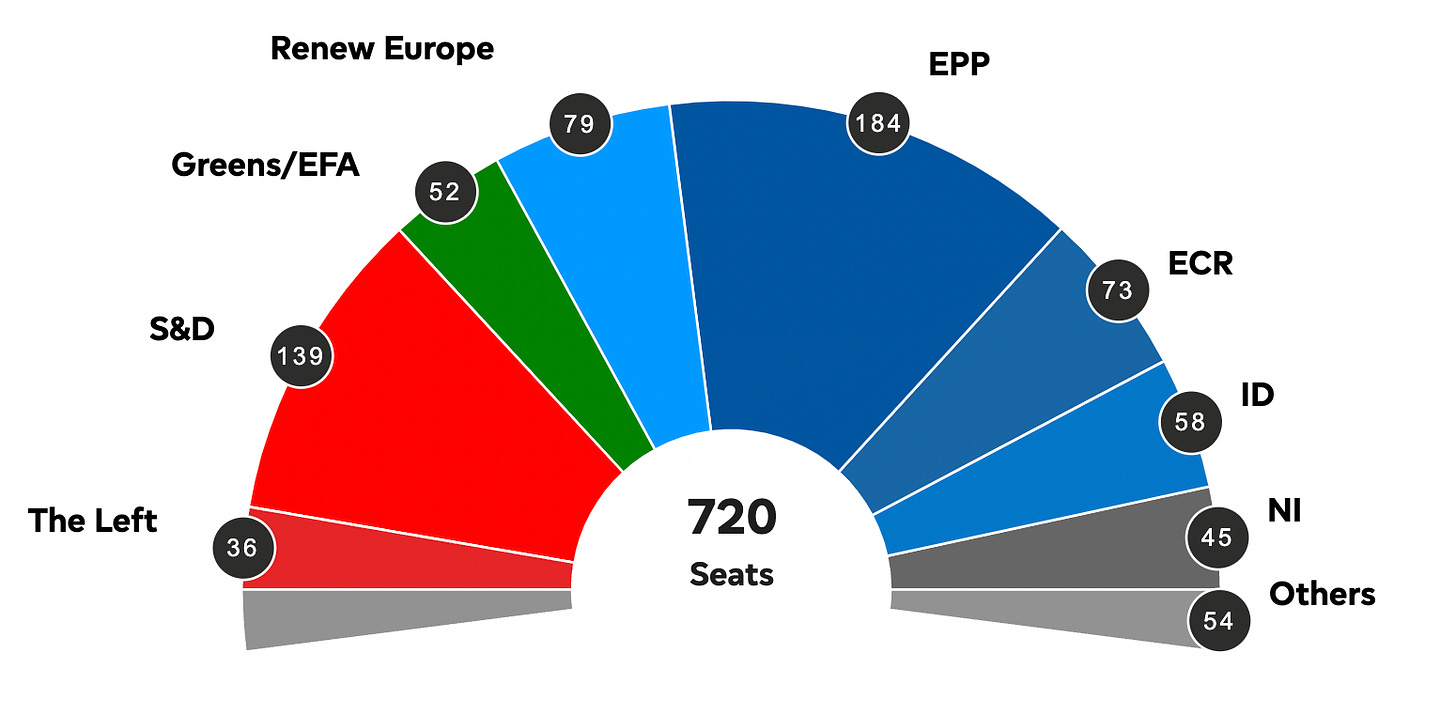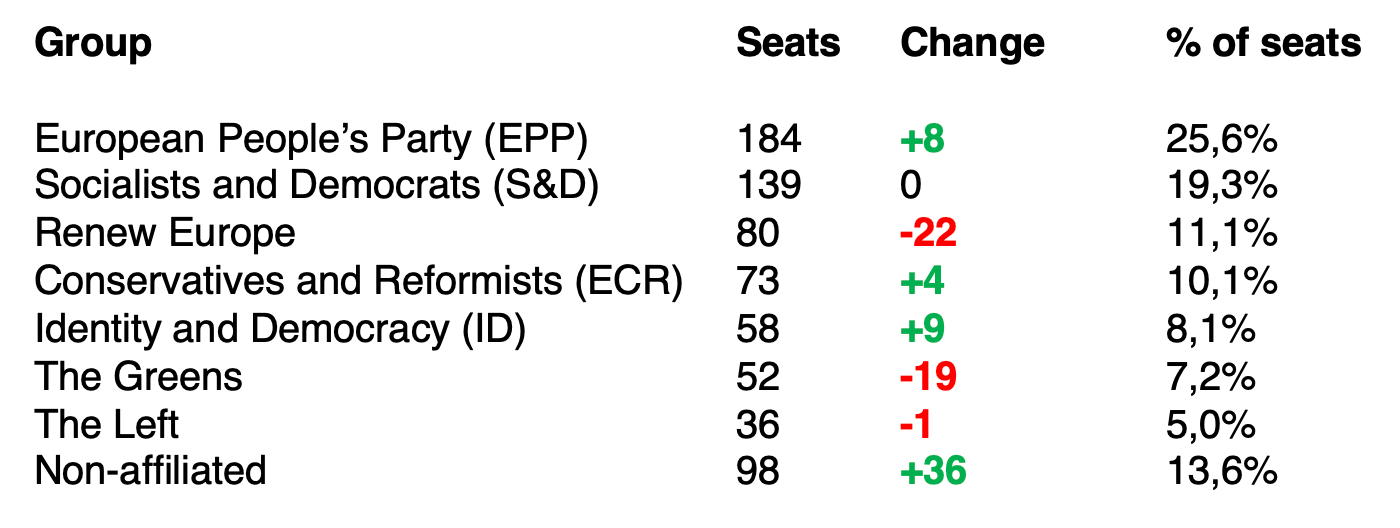Hi! Today is 10 June, and here is your EU news summary for the week. Feel free to share this newsletter with friends and colleagues, and follow us on Twitter and LinkedIn.
The Briefing
The European election results are in, and here’s our first analysis, the morning after.

RESULTS • Here are the provisional results of the European elections as of 10 June:
Some observations:
This European Parliament closely resembles the previous one. Overall, political groups maintain roughly similar shares.
A rightward shift: the EPP, ECR, ID group, and far-right non-affiliates are all strengthening their positions in Parliament.
The far-right is progressing, but less than anticipated.
The pro-European majority — comprising the Social Democrats, Renew, and the EPP — still holds, but is weakened. The European Parliament's political orientation is expected to remain relatively stable.
The EPP is the election winner, retaining its position as the largest political group, which bolsters its legitimacy to support Ursula von der Leyen's bid for a second term as President of the European Commission.
The non-affiliated group (including Germany's AfD and Hungary's Fidesz) made significant gains.
Renew Europe and the Greens are the biggest losers in terms of seats in the European Parliament.
CONTRAST • The keyword for these European election results: contrast.
At the European level, the distribution of seats among political groups remains stable overall. The strong rise of the far-right seen in France and Italy — and to a lesser extent in Germany — is offset by the results in most other Member States, where parties affiliated with the ID and ECR groups did not perform as well.
In Nordic countries, green and far-left parties made significant gains, while the results of the far-right were disappointing:
In Finland, the Left Alliance (The Left group) jumped from sixth to second place, behind the National Coalition Party (EPP). The Finns Party (ECR) scored half its 2019 result.
In Sweden, the Greens overtook the Sweden Democrats (SD) (ECR), who scored lower than in 2019.
In Denmark, the Greens closely follow the Liberals and Social Democrats.
In Poland, the far-right Confederation entered the European Parliament with a disappointing 11.8%. Donald Tusk’s Civic Coalition achieved the best result (37.4%), while the Law and Justice party finished second (35.7%) in an election for the first time in a decade.
In the Netherlands, Geert Wilders’ far-right party scored well (17.7%) but was overtaken by the alliance between the greens and the socialists (21.6%).
BERLIN • In Germany, these elections are a rebuke for Chancellor Olaf Scholz (SPD) and his coalition. The victory of the CDU/CSU (center-right) was expected: the real contest was for second place which AfD managed to get, leaving the third place for the SPD.
The AfD won 15.6% of the vote (up from 11% in 2019) while the SPD performed worse than in 2019 with 14.1%.
The results are also disappointing for the rest of the SPD-FDP-Greens coalition. The FDP stagnated while the Greens lost 9 seats in the European Parliament.
ROME • In Italy, the election is a victory for Giorgia Meloni — the Brothers of Italy outperformed its 2022 legislative election result with 28.6% of the vote.
The other Italian far-right party, the League, plummeted to 8.8% from 34.3% in 2019. The League was slightly overtaken by the Five Star Movement and is closely followed by Forza Italia.
PARIS • In France, following the expected surge of the National Rally came the shock of the National Assembly’s dissolution.
The legislative elections — scheduled for June 30 and July 7 — create a peculiar sense of necessity for another national vote to formalize an already clear election outcome.
France faces a crucial summer at the European level amid significant national political uncertainty. This will inevitably affect France's position on Ursula von der Leyen's reappointment as Commission President.
In case of a defeat of the presidential majority in the legislative elections, a cohabitation government could significantly influence European affairs. Ministers from Member States sit in the EU Council, which co-legislates with the European Parliament. Heads of State meet in the European Council.
Remember the clashes between Jacques Chirac and Lionel Jospin during France's EU Council presidency in 2000, despite their vow to speak with one voice on Europe. And for those who love archives, revisit the courteous Mitterrand-Balladur duo at the European Council in Copenhagen in 1993.
In the long term — barring another dissolution — the separation of legislative and presidential elections raises the risk of more frequent cohabitation governments in the latter half of the presidential term. This could lead to France speaking with divergent voices on the European stage in Brussels.
URSULA • The election results seem to confirm the scenario that Ursula von der Leyen, who is seeking a second term as European Commission President, is likely to face.
The weakening of the pro-European coalition — which enabled her appointment in 2019 — means that the former German minister will need to rally members from other political groups to her cause, especially as some parties in her coalition have already announced they won’t support her.
EPP President Manfred Weber has called on Olaf Scholz and Emmanuel Macron to acknowledge the election results by supporting von der Leyen’s candidacy. “Anything else would lead to great political instability in Europe and I warn against that. That’s why we now need clarity from the other parties quickly,” he said after the election results came in.
WHAT’S NEXT • In the coming weeks, MEPs will be busy renegotiating the composition of the various European parliamentary groups.
Meanwhile, EU heads of states and governments are gearing up for tough negotiations over the European Commission presidency and the various commissioners.
In Case You Missed It
BIG MAC • McDonald’s has lost a legal battle over the exclusive right to use the “Big Mac” label for chicken burgers sold in the EU.
The EU General Court ruled that McDonald’s failed to demonstrate “genuine use within a continuous period of five years” of the trademark for its poultry burgers.
McDonald’s registered the name “Big Mac” as an EU trademark in 1996. The Irish fast food chain Supermac’s argued that McDonald’s had impeded its expansion across Europe by holding the label without using it for certain products, such as those containing chicken.
Supermac’s filed for revocation of the “Big Mac” trademark in 2017, and the EU Intellectual Property Office (EUIPO) partially granted this request in 2019.
Following Supermac’s example, other companies can now use the “Big Mac” name for their poultry products.
McDonald's retains the trademark for its beef burgers. This decision can still be appealed to the European Court of Justice.
ENLARGEMENT • Ukraine and Moldova meet the necessary conditions to begin EU accession negotiations. This was stated by a European Commission spokesperson on June 7 during a midday press briefing. The final decision to launch accession talks rests with the EU Member States.
Twelve governments have sent a joint letter to the Belgian presidency of the EU Council to advance the accession process for Ukraine and Moldova by the end of June — with a General Affairs Council on the 25th followed by a European Council meeting on the 27th-28th.
The signatories are the Czech Republic, Sweden, Estonia, Finland, Portugal, Latvia, Poland, Lithuania, Germany, Slovenia, Romania, and Slovakia.
Some EU countries are dragging their feet. Hungary firmly opposes Ukraine's accession to the EU. Budapest, which will take over the rotating presidency of the EU Council in July, could therefore delay the start of Ukraine's accession talks.
France, on the other hand, has shown strong support for Ukraine and Moldova in their EU integration efforts, as well as their NATO membership bids. President Macron has also announced a 200 million euro support fund to help Ukraine's economy, particularly for businesses looking to export and invest in the country's critical infrastructure.
As a reminder, Ukraine submitted its application to join the EU in February 2022, shortly after Russia's invasion began. Moldova followed suit a month later. Both countries were granted candidate status in June 2023.
ECB • On June 6, the European Central Bank (ECB) announced a cut in its three key interest rates — the first reduction in five years. Between the summer of 2022 and September 2023, the ECB raised its rates ten times.
The cut approved by the Governing Council amounts to a quarter point, lowering the deposit rate to 3.75%. "Since September 2023, inflation has fallen by more than 2.5 percentage points and the inflation outlook has improved markedly," the ECB explained in a press release.
This cut was anticipated, having been pre-announced by several ECB governors. ECB President Christine Lagarde stated that it is "very likely" this reduction will be the first in a series, though she did not specify the timeline for the coming months.
In its press release, the Governing Council stated it would “continue to follow a data-dependent and meeting-by-meeting approach to determining the appropriate level and duration of restriction”.
What We’ve Been Reading
Christina Keßler defends the Spitzenkandidat process in a brief for the CER.
Zsolt Darvas, at Bruegel, and Basile Grassi, at VoxEU, both look at the convergence of Eastern and Western economies, twenty years after the simultaneous accession of ten countries to the EU.
This edition was prepared by the What’s up EU team, including Lidia Bilali, Elisa Zevio, Lucie Ronchewski and Maxence de La Rochère. See you next week!



